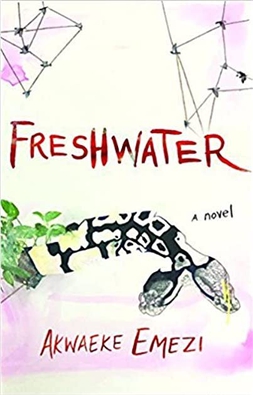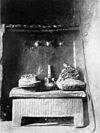Related Research Articles

The afterlife or life after death is a purported existence in which the essential part of an individual's stream of consciousness or identity continues to exist after the death of their physical body. The surviving essential aspect varies between belief systems; it may be some partial element, or the entire soul or spirit, which carries with it one's personal identity.

Reincarnation, also known as rebirth or transmigration, is the philosophical or religious concept that the non-physical essence of a living being begins a new life in a different physical form or body after biological death. In most beliefs involving reincarnation, the soul of a human being is immortal and does not disperse after the physical body has perished. Upon death, the soul merely becomes transmigrated into a newborn baby or an animal to continue its immortality. The term transmigration means the passing of a soul from one body to another after death.

Odinani, also known as Odinala, Omenala, Odinana, and Omenana, is the traditional cultural belief and practice of the Igbo people of south east Nigeria. These terms, as used here in the Igbo language, are synonymous with the traditional Igbo "religious system" which was not considered separate from the social norms of ancient or traditional Igbo societies. Theocratic in nature, spirituality played a huge role in their everyday lives. Although it has largely been syncretised with Catholicism, the indigenous belief system remains in strong effect among the rural, village and diaspora populations of the Igbo. Odinani can be found in Haitian Voodoo, Obeah, Santeria and even Candomblé. Odinani is a pantheistic and polytheistic faith, having a strong central deity at its head. All things spring from this deity. Although a pantheon of other gods and spirits, these being Ala, Amadiọha, Anyanwụ, Ekwensu, Ikenga, exists in the belief system, as it does in many other Traditional African religions, the lesser deities prevalent in Odinani serve as helpers or elements of Chukwu, the central deity.

The Igbo people are an ethnic group in Nigeria. They are primarily found in Abia, Anambra, Ebonyi, Enugu, and Imo States. Ethnic Igbo populations are found in Cameroon, Gabon, and Equatorial Guinea, as migrants as well as outside Africa. There has been much speculation about the origins of the Igbo people, which are largely unknown. The Igbo people are one of the largest ethnic groups in Africa.

A changeling, also historically referred to as an auf or oaf, is a human-like creature found throughout much of European folklore. A changeling was a substitute left by a supernatural being when kidnapping a human being. Sometimes the changeling was a 'stock', more often the changeling was a supernatural being made magically to look like the kidnapped human. Supernatural beings blamed for stealing children included fairies, demons, trolls, nereids and many others. Usually, the kidnapped human was a child; but there were cases, particularly in Scandinavia and Ireland, where adults were taken.

The Igala people are a Yoruboid ethnolinguistic group native to the region immediately south of the confluence of the Niger and Benue Rivers in central Nigeria. The area inhabited primarily by the Igala is referred to as Igalaland. Situated in an especially ecologically diverse region of Nigeria, the Igala have traditionally engaged in crop cultivation, and have been influenced culturally by many surrounding cultures over the centuries. Today, people of Igala descent are estimated to be at a population of 1.68 million people.
An ọgbanje is a term in Odinani for what was thought to be an evil spirit that would deliberately plague a family with misfortune. Belief in ọgbanje in Igboland is not as strong as it once was, although there are still some believers.
An Iyi-uwa is an object from Igbo mythology that binds the spirit of a dead child to the world, causing it to return and be born again to the same mother.

The beliefs and practices of African people are highly diverse, and include various ethnic religions. Generally, these traditions are oral rather than scriptural and are passed down from one generation to another through narratives, songs, and festivals. They include beliefs in spirits and higher and lower gods, sometimes including a supreme being, as well as the veneration of the dead, use of magic, and traditional African medicine. Most religions can be described as animistic with various polytheistic and pantheistic aspects. The role of humanity is generally seen as one of harmonizing nature with the supernatural. They generally seek to explain the reality of personal experience by spiritual forces which underpin orderly group life, contrasted by those that threaten it. Unlike Abrahamic religions, African traditional religions are not idealisations; they seek to come to terms with reality as it is.

Hawkman is a superhero appearing in American comic books published by DC Comics. He is the first character to use the name Hawkman. There are two separate origins of Carter Hall; the Golden Age origin and the Post-Hawkworld origin.
Death rituals were an important part of Maya religion. The Maya greatly respected death; they were taught to fear it and grieved deeply for the deceased. They also believed that certain deaths were more noble than others.

Jim B. Tucker is a child psychiatrist and Bonner-Lowry Professor of Psychiatry and Neurobehavioral Sciences at the University of Virginia School of Medicine. His main research interests are documenting stories of children who he claims remember previous lives, and natal and prenatal memories. He is the author of Life Before Life: A Scientific Investigation of Children’s Memories of Previous Lives, which presents an overview of over four decades of reincarnation research at the Division of Perceptual Studies. Tucker worked for several years on this research with Ian Stevenson before taking over upon Stevenson's retirement in 2002.
Reincarnation is the concept that the soul, after biological death, begins a new life in a new body.

West African mythology is the body of myths of the people of West Africa. It consists of tales of various deities, beings, legendary creatures, heroes and folktales from various ethnic groups. Some of these myths traveled across the Atlantic during the period of the Trans-Atlantic slave trade to become part of Caribbean, African-American and Brazilian mythology.

Inu × Boku SS, also known as Youko × Boku, is a Japanese manga series written and illustrated by Cocoa Fujiwara. It was serialied in Square Enix's Gangan Joker magazine from April 2009 to February 2014, with its chapters collected in eleven tankōbon volumes. An anime television series adaptation by David Production aired in Japan between January and March 2012. The anime has been licensed by Sentai Filmworks for streaming, and home video release in North America.

Life and Death Are Wearing Me Out is a 2006 novel by Chinese writer Mo Yan, who won the Nobel Prize for Literature in 2012. The book is a historical fiction exploring China's development during the latter half of the 20th century through the eyes of a noble and generous landowner who is killed and reincarnated as various farm animals in rural China. It has drawn praise from critics, and was the recipient of the inaugural Newman Prize for Chinese Literature in 2009. An English translation was published in 2008.

Kev Dab Kev Qhuas is the common ethnic religion of the Miao people, best translated as the "practice of spirituality". The religion is also called Hmongism by a Hmong American church established in 2012 to organize it among Hmong people in the United States.
Isekai is a genre of Asian stories. It includes novels, light novels, films, manga, anime, and video games that revolve around a displaced person or people who are transported to and have to survive in another world such as a fantasy world, game world, or parallel universe with or without the possibility of returning to their original world. Isekai is one of the most popular genres of anime, and isekai stories share many common tropes – for example, a powerful protagonist who is able to beat most people in the other world by fighting. This plot device typically allows the audience to learn about the new world at the same pace as the protagonist over the course of their quest or lifetime. If the main characters are transported to a game-like world, the genre can overlap with LitRPG.

Disgaea 6: Defiance of Destiny is a tactical role-playing video game developed and published by Nippon Ichi Software as part of the Disgaea series. It was released for Nintendo Switch and PlayStation 4 on January 28, 2021, in Japan, and by Sega on May 27, 2021, in Asia. NIS America released the Nintendo Switch version worldwide on June 29, 2021. In total, the game was translated into French, English, Traditional Chinese and Korean. A version with all previous downloadable content, titled Disgaea 6 Complete, was released for PlayStation 5 on June 16, 2022, in Japan, followed by a worldwide release on June 28, 2022, alongside PlayStation 4 and Windows platforms.

Freshwater is a 2018 autobiographical fiction novel by Nigerian writer Akwaeke Emezi. Emezi's debut novel, it tells the story of Ada, a girl with multiple ogbanje dwelling inside her. A TV series based on the novel is under development by FX.
References
- 1 2 Abstractsagepub.com Archived 2008-06-12 at the Wayback Machine
- ↑ "Legend of the Ogbanje: Superhuman Abilities, Wanderlust between Life and Death - Afrocritik". 2021-11-13. Retrieved 2022-08-11.
- ↑ Emezi, Akwaeke (2018-01-19). "Transition". The Cut. Retrieved 2022-08-11.
